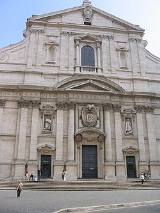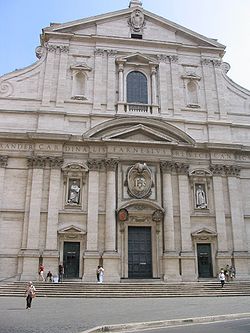
Giacomo della Porta
Encyclopedia

Italy
Italy , officially the Italian Republic languages]] under the European Charter for Regional or Minority Languages. In each of these, Italy's official name is as follows:;;;;;;;;), is a unitary parliamentary republic in South-Central Europe. To the north it borders France, Switzerland, Austria and...
architect and sculptor, who worked on many important buildings in Rome, including St. Peter's Basilica
St. Peter's Basilica
The Papal Basilica of Saint Peter , officially known in Italian as ' and commonly known as Saint Peter's Basilica, is a Late Renaissance church located within the Vatican City. Saint Peter's Basilica has the largest interior of any Christian church in the world...
. He was born at Porlezza
Porlezza
Porlezza is a comune on Lake Lugano in the Province of Como in the Italian region Lombardy, located about 60 km north of Milan and about 25 km north of Como...
, Lombardy
Lombardy
Lombardy is one of the 20 regions of Italy. The capital is Milan. One-sixth of Italy's population lives in Lombardy and about one fifth of Italy's GDP is produced in this region, making it the most populous and richest region in the country and one of the richest in the whole of Europe...
and died in Rome.
Biography
Della Porta was influenced by and collaborated with MichelangeloMichelangelo
Michelangelo di Lodovico Buonarroti Simoni , commonly known as Michelangelo, was an Italian Renaissance painter, sculptor, architect, poet, and engineer who exerted an unparalleled influence on the development of Western art...
, and Giacomo Barozzi da Vignola
Giacomo Barozzi da Vignola
Giacomo Barozzi da Vignola was one of the great Italian architects of 16th century Mannerism. His two great masterpieces are the Villa Farnese at Caprarola and the Jesuits' Church of the Gesù in Rome...
, his teacher of architecture. After 1563 he carried out Michelangelo's plans for the rebuilding of the Campidoglio or Capitoline Hill's open spaces where he completed the façade and steps of Palazzo Senatorio, and the Cordonata
Cordonata
Cordonata is a sloping road composed of transversal stripes , which are made with stone or bricks. It has a form almost similar to a flight of steps, but allows the transit of horses and donkeys...
capitolina or the ramped steps up to the Piazza del Campidoglio.
After the death of Vignola in 1573, he continued the construction of Il Gesù, the mother church of the Jesuit order, and in 1584 modified its façade after his own designs.
From 1573 he was in charge of the ongoing construction of St. Peter's Basilica, and later, in collaboration with Domenico Fontana
Domenico Fontana
Domenico Fontana was a Swiss-born Italian architect of the late Renaissance.-Biography:200px|thumb|Fountain of Moses in Rome....
, completed Michelangelo's dome between 1588-1590.
Giacomo della Porta completed a number of Rome's fountains from the 16th century; these included the fountains in the Piazza del Popolo
Piazza del Popolo
Piazza del Popolo is a large urban square in Rome. The name in modern Italian literally means "People's Square", but historically it derives from the poplars after which the church of Santa Maria del Popolo, in the northeast corner of the piazza, takes its name.The piazza lies inside the northern...
, the Fountain of Neptune, Rome
Fountain of Neptune, Rome
The Fontana del Nettuno is a fountain in Rome, Italy, located at the north end of the Piazza Navona. It was once called "Fontana dei Calderari" because it was located close to a small alley with blacksmith's workshops, makers of pots and pans and of other metal based businesses, all of them...
and La Fontana del Moro in the Piazza Navona
Piazza Navona
Piazza Navona is a city square in Rome, Italy. It is built on the site of the Stadium of Domitian, built in 1st century AD, and follows the form of the open space of the stadium. The ancient Romans came there to watch the agones , and hence it was known as 'Circus Agonalis'...
.
Selected works
- Oratorio del SS. Crocifisso (1562-1568)
- Chiesa del Gesù (1571-1575)
- Fountains at the Palazzo BorghesePalazzo BorghesePalazzo Borghese is a palace in Rome, Italy, the main seat of the Borghese family in. It was nicknamed il Cembalo due to its unusual trazezoidal groundplan; its shortest front faces the River Tiber...
(1573) - Fountains in Piazza ColonnaPiazza ColonnaPiazza Colonna is a piazza at the center of the Rione of Colonna in the historic heart of Rome, Italy. It is named for the marble Column of Marcus Aurelius which has stood there since 193 CE. The bronze statue of Saint Paul that crowns the column was placed in 1589, by order of Pope Sixtus V...
(1574) - Small fountains at Piazza NavonaPiazza NavonaPiazza Navona is a city square in Rome, Italy. It is built on the site of the Stadium of Domitian, built in 1st century AD, and follows the form of the open space of the stadium. The ancient Romans came there to watch the agones , and hence it was known as 'Circus Agonalis'...
(1574) - One fountain at the Piazza della RotondaPantheon, RomeThe Pantheon ,Rarely Pantheum. This appears in Pliny's Natural History in describing this edifice: Agrippae Pantheum decoravit Diogenes Atheniensis; in columnis templi eius Caryatides probantur inter pauca operum, sicut in fastigio posita signa, sed propter altitudinem loci minus celebrata.from ,...
- Palazzo Senatorio at the Capitol Hill (1573-1602)
- Palazzo della SapienzaUniversity of Rome La SapienzaThe Sapienza University of Rome, officially Sapienza – Università di Roma, formerly known as Università degli studi di Roma "La Sapienza", is a coeducational, autonomous state university in Rome, Italy...
(1578-1602) - Palazzo Capizucchi (1580)
- Santa Maria dei Monti (1580)
- Sant'Atanasio dei Greci (1581)
- Façade of San Luigi dei FrancesiSan Luigi dei FrancesiThe Church of St. Louis of the French is a Roman Catholic minor basilica and titular church in Rome, not far from Piazza Navona. The church is dedicated to the Virgin Mary, to St. Denis the Areopagite and St. Louis IX, king of France...
(1589) - Fontana delle TartarugheFontana delle TartarugheThe Fontane delle Tartarughe is a fountain of the late Italian Renaissance, located in the Piazza Mattei, in the Sant'Angelo district of Rome, Italy. It was built between 1580 and 1588 by the architect Giacomo della Porta and the sculptor Taddeo Landini...
(1584) - Santa Maria Scala CoeliSanta Maria Scala CoeliSanta Maria Scala Coeli , church on the site of St Paul the Apostle's prison, on Via delle Tre Fontane in Rome....
- Palazzo Marescotti (1585)
- Palazzo Serlupi (1585)
- SS. Trinità de' MontiTrinità dei MontiThe church of the Santissima Trinità dei Monti is a late Renaissance titular church in Rome, central Italy. It is best known for its commanding position above the Spanish Steps which lead down to the Piazza di Spagna...
(1586) - Fontana di Piazza alli Monti (1589)
- Cupola of St. Peter's BasilicaSt. Peter's BasilicaThe Papal Basilica of Saint Peter , officially known in Italian as ' and commonly known as Saint Peter's Basilica, is a Late Renaissance church located within the Vatican City. Saint Peter's Basilica has the largest interior of any Christian church in the world...
(1588-90) - Fountains at the Piazza di Santa Maria in CampitelliSanta Maria in CampitelliSanta Maria in Campitelli or Santa Maria in Portico is a church dedicated to the Virgin Mary on the Piazza di Campitelli, Rome, Italy....
(1589) - Fountains opposite SS. Venanzio e Ansovino (1589)
- Fontana della Terrina (1590)
- Sculpture "Christ delivering the keys of Heaven to St. Peter" (1594), altar of the St. Peter chapel, church Santa PudenzianaSanta PudenzianaThe basilica of Santa Pudenziana is a 4th century church in Rome, dedicated to Saint Pudentiana, sister of Saint Praxedis and daughter of Saint Pudens. It is the national church of the Philippines....
- Palazzo Fani (1598)
- San Paolo alle Tre FontaneSan Paolo alle Tre FontaneSan Paolo alle Tre Fontane , in English, St Paul at the Three Fountains is a church dedicated to St Paul the Apostle, at the presumed site of his martyrdom in Rome...
(1599) - San Nicolò in CarcereSan Nicola in CarcereSan Nicola in Carcere is a titular church in Rome near the Forum Boarium in rione Ripa. It is one of the traditional stational churches of Lent.-History:...
(1599) - Palazzo Albertoni Spinola (1600)
- Villa Aldobrandini (1600-02) in FrascatiFrascatiFrascati is a town and comune in the province of Rome in the Lazio region of central Italy. It is located south-east of Rome, on the Alban Hills close to the ancient city of Tusculum. Frascati is closely associated with science, being the location of several international scientific...
- Cappella Aldobrandini (1600-02) in Santa Maria sopra MinervaSanta Maria sopra MinervaThe Basilica of Saint Mary Above Minerva is a titular minor basilica and one of the most important churches of the Roman Catholic Dominican order in Rome, Italy. The church, located in the Piazza della Minerva in the Campus Martius region, is considered the only Gothic church in Rome. It houses...

